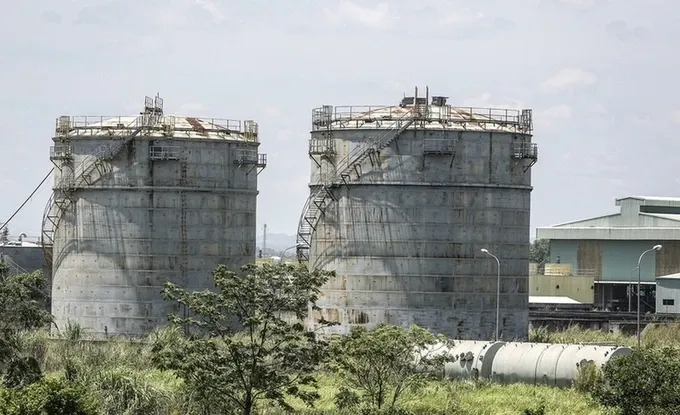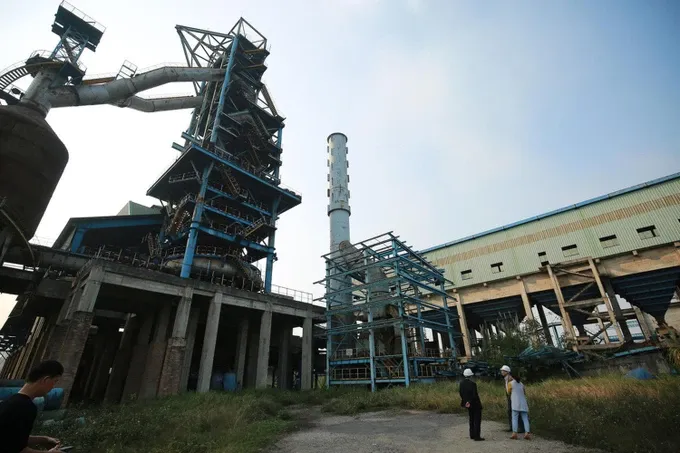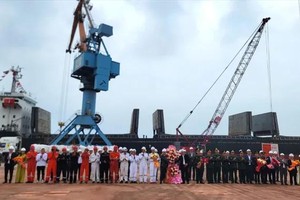
Initiated in 2009, the Phu Tho Biofuel (Ethanol) Production Plant project has remained stagnant for nearly 15 years, transforming into the largest rust-covered industrial skeleton in the midlands region. From the Trung Ha bridge, it is easy to witness a construction site frozen in time, abandoned for over a decade.
The expansive site lies eerily silent – no machinery, no vehicles, no workers. Within the perimeter, buildings and workshops have decayed, with vegetation growing chest-high, resembling an abandoned cemetery. Due to the plant's prolonged dormancy, hectares of land are now nurturing wild grass and hosting a few chickens and geese.
Local elderly residents have virtually forgotten about this ambitious biofuel project, as it has never produced a single drop of fuel since its inception. 71-year-old Nguyen Van Vinh, who lives near the project, recounted how authorities requisitioned dozens of hectares of rice fields from villagers, with the project halting in 2011 after substantial investment.
Several frustrated locals complained about the low compensation received for their land, the billions of dollars invested in the project, and the lack of jobs created for the community. Despite inquiries to the Van Xuan Commune People's Committee and the Tam Nong District People's Committee, local officials admitted they had limited information about the project's status and the efforts to resolve the impasse.
Such a large-scale project, when stalled, is a huge waste of resources, from the physical deterioration of equipment, land degradation, to the loss of investment, severely devastating the local economy. A leader from the Tam Nong District People's Committee mentioned that the government had planned to establish a vast cassava cultivation area across Phu Tho, Lao Cai, Yen Bai, and Tuyen Quang Provinces to supply the plant. However, after two years of cultivation, the plant remained non-operational.
Owned by PV Oil, the Phu Tho Ethanol project commenced in June 2009 on a 50-hectare site, with an initial investment of approximately VND2.5 trillion (US$98.6 million). After investing over VND1.5 trillion ($59 million), the project was abandoned.
Government inspectors primarily attributed the failure to inappropriate contractor selection and insufficient project management expertise. The project was halted mid-construction, leading to investigations, criminal charges, and imprisonment for individuals responsible for the severe consequences of the investment.

In Thai Nguyen City of the northern province of Thai Nguyen, another critical project – the expansion of Thai Nguyen Steel Corp. (TISCO) – faces potential bankruptcy, threatening significant losses for Vietnam's steel industry.
Started in 2005 with an initial investment of VND3.8 trillion ($149.8 million), the second stage of the project (TISCO2) aimed to expand the steel plant's capacity across 108 hectares. Managed by Vietnam Coal and Mineral Industries Group, the project was designed to meet domestic steel demands and reduce imports.
Despite being a pivotal industrial project originally scheduled for completion in 2013, numerous project components remain unfinished. Current production relies primarily on existing facilities, with nearly half of the raw materials still imported.
In a recent working session, TISCO’s General Director Nguyen Minh Hanh outlined the potential catastrophic outcomes of the project.
The project aims to establish a comprehensive metallurgical system, from mining to the production of 500,000 tons of steel billets per year, reducing reliance on imports. However, the project has been stalled since 2013 due to funding constraints and contractual issues with Chinese contractor MCC. This prolonged delay has negatively impacted the company's operations and caused significant repercussions for all stakeholders.
TISCO is actively working with government agencies like the State Capital Management Committee and Vietnam Steel Corporation to address the project’s challenges. The company has inventoried materials and equipment and proposed two solutions, namely terminating the contract with MCC and resuming the project to avoid further waste of state and corporate funds, or completely abandoning the project.
If the proposed solutions are not approved, the project may be entirely scrapped, leading to severe consequences such as significant financial losses for shareholders and creditors, job losses for thousands of workers, and a detrimental impact on the Vietnamese steel industry.
TISCO’s General Director warned that the continued stagnation of the project could lead to the company’s bankruptcy due to the burden of the unfinished project's costs, which are estimated at VND6 trillion ($236.5 million). This could result in negative equity, exceeding the company's capital. Without support from banks and creditors, the company could face bankruptcy.
Additionally, shareholders would lose their investments, including Vietnam Steel Corporation, which has invested VND1.2 trillion ($47 million) and is responsible for a loan guarantee of VND1.86 trillion ($73.3 million). The situation could also harm Vietnam’s steel industry as the TISCO brand is at risk. Nearly 4,000 workers could lose their jobs, causing significant economic instability in the region.
























